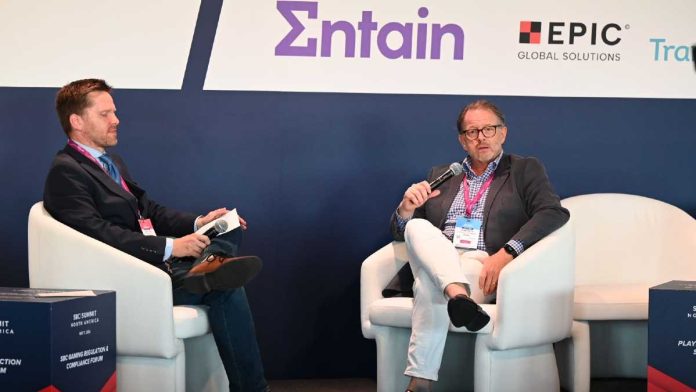According to NCAA Managing Director Mark Hicks, the organization has a pretty clear understanding of the scope of bettor harassment on social media.
Speaking to Entain’s SVP of American Regulatory Affairs & Responsible Gambling Martin Lycka as part of the SBC Summit North America Player Protection Symposium, Hicks cited data from ethical data group and NCAA partner Signify collected during March Madness earlier this year.
Around 2,000 incidents of bettor harassment this March Madness
Hicks said the group counted 50,000 incidents of athlete harassment online, 4,000 of which were serious enough to be turned over to the platform, law enforcement, or, in some cases, both.
Of those 4,000, roughly half could be tied back to sports betting, which explains why Hicks and the NCAA have become increasingly focused on athlete protection as it develops and expands its sports betting protocols.
“The policies that went into NCAA legislation years and years ago were really integrity-focused, but now we’re really starting to focus on athlete well being,” Hicks told Lycka.
While betting is a source of some of the harassment, Hicks acknowledged other forces at play, like prejudice, drive the behavior as well. He noted that female student-athletes were three times more likely to be harassed on social media, which seems to indicate more than betting is at play.
NCAA prez remains concerned about bettor harassment
Nonetheless, it is something the group and NCAA President Charlie Baker are thinking about regularly.
“Sports betting’s here, you have to embrace it,” Hicks admitted. But the way the NCAA does that is fundamentally different than other pro sports organizations.
“We’re not the NFL. We’re not Major League Baseball or the NBA. We’re half a million student-athletes.”
What further complicates things is that these student-athletes are scattered across thousands of campuses across the country and some things, like athlete education around sports betting, can often fall to the conference or school to execute.
“Our role at the national office is to help supply them with resources,” Hicks explained. He cited Signify as well as Epic Global Solutions as examples of those tools. Epic has worked with a number of NCAA schools to offer education programs to athletic departments. Hicks noted that the lived experience some Epic counselors bring to the program has been particularly impactful.
The national office has also prioritized developing first-name relationships with gambling regulators. Earlier this year, Baker called on regulators in every state with sports betting to reconsider offering prop bets on college athletes, with states like Ohio and Louisiana quickly complying.
”It just seems like there is even more risk today than there was in the past. There are so many different types of markets that are out there and more games,” Hicks told the audience. He agreed that it is only one segment of where the harassment is coming from, but voiced Baker’s position that it brings unnecessary targets on the backs of athletes when it comes to harassment.
“President Baker certainly brought in his own experiences going through the legalization of sports betting in Massachusetts. I think this is a topic that is on his mind. He’s very passionate about it.”
“He’s very bothered by the harassment,” Hicks added.
Integrity remains a serious concern for Hicks, NCAA
While athlete well being is a major focus of the NCAA, Hicks also emphasized integrity as the other major piece of the NCAA’s current focus.
“I think now with all these different types of player proposition bets, there is more opportunity for integrity concerns or integrity breaches,” he said, adding that he has been sent a number of cases where athletes have found to be betting on themselves. Most of the bets are on them to overperform the lines oddsmakers set on them, but the fundamental issue of integrity remains a concern.
The co-mingling of athletes on campus and within a school’s athletic department is another wrinkle that complicates things for Hicks and others concerned with college betting integrity.
“Our student-athletes are essentially living in the Olympic Village every day.” They use the same trainers, tutors and academic advisors. With all of this cross-pollination, education about what to do with sensitive information around injuries and who might be playing becomes crucial not just for the athletes but for the support staff as well.
Hicks also pointed to the wild west that is NIL deals and expressed concerns about how to manage new relationships and between athletes and boosters that, up until recently, did not exist. With new access to athletes that previously didn’t exist, these interested fans suddenly have information that was previously behind closed doors.
The critics of the call to ban prop betting at the college level argue that it will drive bettors back into the unregulated market.
“I fully get there is now a risk that some of these bets go to the unregulated market. It’s something we’ve talked about a lot,” Hicks said. “I don’t think it has to be mutually exclusive.”
Like Hicks and the NCAA have to find balance between athlete well being and integrity, so too must operators find a balance between staying competitive against the offshored and creating an environment that does not encourage athletes or bettors to harass or behave nefariously simply because certain markets are available.
The full episode of The Safe Bet Show will be published on SBC Americas in the coming weeks.














